//
Microbiome therapeutics, Photoshop for augmented reality, and cancer treatments were some of the ideas presented at Day 2 of startup accelerator Y Combinator’s Winter 2018 Demo Day. YC is increasingly using its massive class size (141 startups this time around) to fund especially risky frontier technology and biotech moonshots, while tempering the portfolio with more predictable enterprise companies.
Investors say that valuations for post-Demo Day raises have risen steeply recently. Some speculate that people who made a fortune on cryptocurrency are trying to invest their returns elsewhere, driving up demand for YC startups.
The accelerator still admits many international copycats of U.S. successes, and YC is also repeating itself a bit. The Podcast App pitched the exact same product and strategy as Breaker, which debuted at YC exactly a year ago. But there were plenty of ambitious and unique businesses unveiled today on the Mountain View Computer History Museum stage, and the room was — as always — packed with a who’s who of tech investors.
Check out our coverage of all 64 startups that launched on the record yesterday, plus our picks for the top 7 companies from yesterday. (Tomorrow morning we’ll have our favorites from today.)
Here are the 60+ startups that launched at YC’s Winter 2018 Demo Day 2:
Callisto

Callisto is a sexual misconduct reporting software built for victims.
The company’s product works by asking people who are looking to report a perpetrator to give certain unique identifiers, like a LinkedIn profile or phone number. If two victims name the same perpetrator, they are put in touch with each other and then with with an “options counselor,” a lawyer who can give them options on how to proceed in handling the situation. The company says that victims that visit Callisto’s website are 5x more likely to take action. They’ve started by rolling out their product on college campuses and are now taking donation from investors to roll out the service to the startup community.
Bump

Bump is a peer-to-peer streetwear marketplace.
It’s the “eBay for Generation Z.” They’ve been rapidly building an online community, and achieved $25,000 revenue on $430,000 GMV already in the month of March. They claim to be profitable and also have a user community that’s engaged. Bump says that 600,000 messages are sent be users for every week. They believe they can eventually move beyond streetwear.
Read more about Bump on TechCrunch here.
The One Health Company
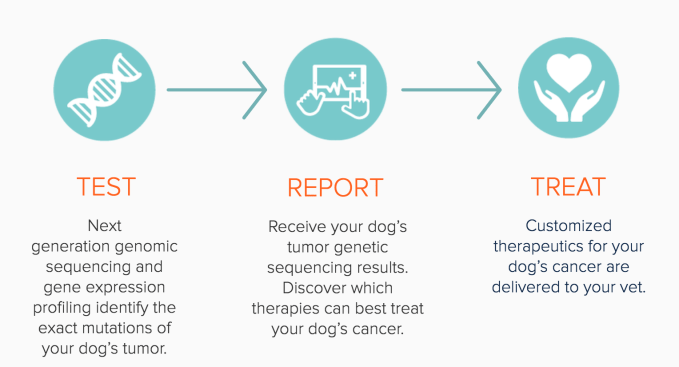
One Health wants to improve the treatment of canine cancer, using genomic testing and gene sequence to improve diagnosis and the efficacy of treatments.
They are running currently 2 test pilots, where they’ve made $39,000 in about two weeks
Onederful

Onederful is an API for dental insurance.
Onederful says dentists offices lose $6B in revenue per year due to insurance claim problems, and spend $3 billion a year on high friction claim verification. Onederful’s API integrates with 240 insurance providers to rapidly and reliably verify a patient’s insurance and make sure the dentist gets paid.
Onederful doesn’t have to sell dentist by dentist, and instead is developing partnerships with the top dentist software suites for distribution. It’s currently in 120 offices.
Anjuna

Anjuna protects applications running in the public cloud.
The company says that right now about 30 percent of workloads are in the public cloud, and their goal is to help migrate the other 70 percent. The startup is using its memory encryption technologies to protect applications while in use, at rest and in transit. The company claims it can keep them protected even if someone nefarious has root access to the host.
BioRender.io

BioRender.io wants to standardize the “visual language of biology and the software to communicate it.”
They believe there’s a $11 billion market opportunity to eliminate “ugly science pictures. So far they’ve been working with 300 institutions, including SaaS businesses in the life science industries. Their work has also been featured in science journals.
Airship
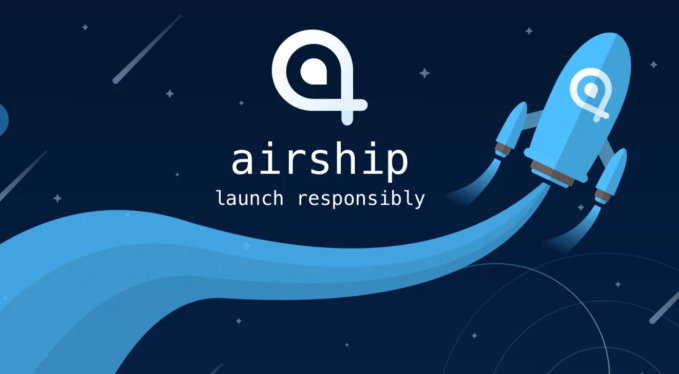
Airship is building a feature flagging framework that lets small startups roll out products the same way the the big tech companies do.
While A/B testing startups generally tackle small content changes like different headlines, Airship is letting customers ship entirely different features to swaths of users so that companies are more informed about how their audiences will react to redesigns or updates.
Read more about Airship on TechCrunch here.
Gainful

Gainful makes personalized protein shakes.
Most protein shakes are designed for and marketed to male jocks and body builders. Gainful has customers take a five minute health quiz, then get personalized shakes delivered. 80K people have taken the quiz, building a huge health data archive for the startup. It has 2700 customers, with over half of whom buy a bottle. Gainful is growing 85 percent monthly with $40K in sales in February, and it’s profitable on each customer’s first purchase. Eventually, Gainful could expand into sports drinks, meal replacements, and personalized fitness plans utilizing the data its competitors aren’t collecting.
Quantierra

Quantierra sources real estate investments for developers.
It uses their database and algorithms to determine what can be built, its value, and the probability of it selling. Taking a 1.5% cut of any property they help sell, They’ve made $141,000 in revenue in 3 months, and say they have $310,000 in signed term sheets.
BloomJoy

BloomJoy wants to be the “associated press for lifestyle content.”
They create and syndicate the content that they claim is currently seeing five million weekly readers in just a few short weeks. So far, they work with 19,000 publishers and have been generating $25,000 per week in ad revenue. It’s a $5 billion market opportunity, they believe. The team has a media background and previously sold a startup for $18 million.
YouTeam

YouTeam lets you “rent” engineers who work at consulting firms but aren’t currently doing anything.
The company takes a 20% cut of each job. They say they’re currently making $55k in net revenue per month.
Substack
Substack is a subscription publishing platform.
Subscription payments free journalists from relying on clickbait and sensationalism to get clicks and ad views. Substack lets any publisher or individual instantly launch a subscription product. Substack has 7,000 subscribers paying an average of $70 per year, and it takes a 10 percent cut. Its top writer now earns $300K. Eventually Substack wants to turn subscriber bases into communities, and expand into podcasts and video. With Kik’s CTO and a former journalist on its founding team, Substack wants to bring back the journalism revenue that’s slipped away to the social networks.
For more on Substack, read TechCrunch’s coverage here.
HelloVerify

HelloVerify is doing online instant background checks in India where the the government has recently announced it will begin digitizing all personal records.
The startup has lined itself up to be among the first to take advantage of this legislation. The company currently has $3 million in annual revenue and has closed $1 million in orders in the past 60 days. The company’s early customers include Accenture, Infosys and Cognizant.
Look After My Bills
Look After My Bills is for people who want “lower bills with less hassle.”
The UK-based startup claims it can save users $320 per year by helping them manage energy, cell phones and broadband bills, by helping them switch providers and optimize for saving. They make $60 in commission every time a user switches businesses and have generated $84,000 so far this month from its 4000 users.
Station
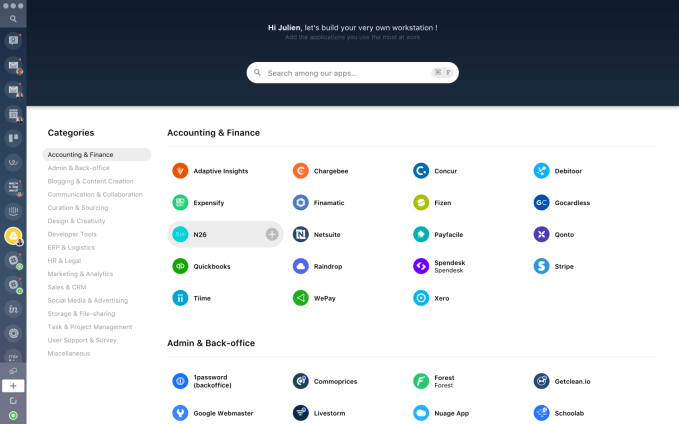
Station wants to be the app store of software-as-a-service by becoming the web browser people use while at work.
It bakes workplace apps into a sidebar on the browser for easy access that doesn’t see you getting lost in endless tabs. It’s integrated 500 different SAAS applications, with users downloading an average of 12. Station now has 11K weekly active users who spend more than 4.5 hours a day in the app. Eventually it wants to sell opportunities for deeper integrations to the big SAAS companies, and promotional discovery of their apps.
Torch

Torch want to bring executive coaching to entire companies.
The startup uses video-based conferencing software to help coach managers on skills that can help that improve. Managers can log in, set goals and track progress in Torch’s analytics dashboard. Torch was founded by a former executive coach and a data scientist. The team says that the startup’s revenue has been growing 45 percent month-over-month.
Edwin

Edwin uses AI to teach English.
They say they can teach English in ⅓ of the time, at a ⅓ of the cost. You communicate with Edwin via Facebook Messenger or a voice assistant; on Facebook, for example, they have already obtained 757,000 users.
Meitre
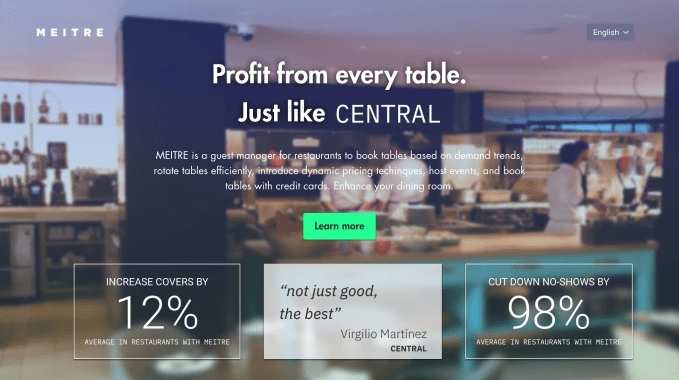
Meitre aims to be “Opentable for the world’s top restaurants.”
Focusing on the “top 3%” of restaurants that don’t have trouble getting reservations, Meitre says that instead of paying Opentable, they’ve found 55 restaurants that will pay them to reduce no-shows, sell more tasting menus and move demand to off-peak hours. This can result in “hundreds of thousands of more revenue each year,” they claim. So far, they haven’t had any customers churn and hope to expand to the estimated 50,000 restaurants worldwide that need this.
Pathrise

Pathrise helps train students to get better jobs in exchange for a percentage of their future salary via an income sharing agreement.
University career counselors are outnumbered by students 2900 to 1 on average, and their offices are outdated. First it learns about the student and uses data to surface relevant job openings. Its training can improve students’ cold emailing of recruiters, resumes, interview skills, and salary negotiations. It expects to earn $5K per student it gets hired. Starting with the 750K software engineering students, Pathrise sees a $3.75 billion market, and plans to eventually expand into other job types. Students spend a ton on their education, they scramble to get a job to pay back loans. Path rise could help them better leverage their schooling and find the right job for them.
TrapFi

TrapFi pays freelance developers for contributing to projects as soon as their pull request is approved, rather than waiting for a monthly check.
They charge 1.5% of earnings made on the platform; in 2 weeks, they say they’ve picked up 500 users and generated $25,000 in transactions.
Sixfold Bioscience
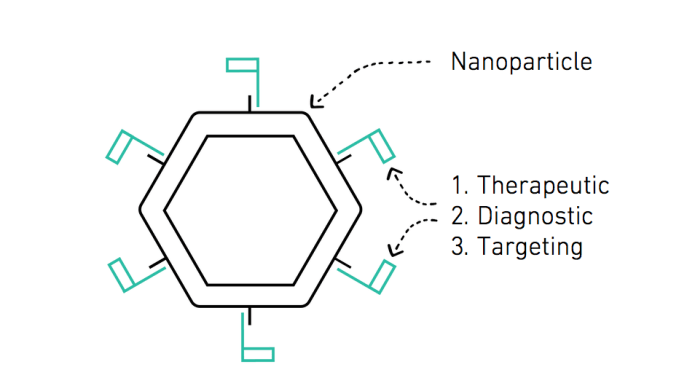
Sixfold designs nanoparticles for treating cancer and other diseases.
They claim to be able to deliver gene editing drugs developed in CRISPR in a way that targets diseased cells without impacting healthy cells. They’re currently testing their nanoparticles in mice.
Jido Maps

Jido Maps is an AR startup that’s approaching the problem of persistence, or getting digital objects to stay affixed to the real world environment even when the sensors aren’t there to observe them.
The company calls itself a “save button” for AR, allowing users to place objects, save them and share that information with other users. After one month of beta, 59 companies are using the startup’s API and will soon deploy it to their combined 300k monthly active users.
Atrium
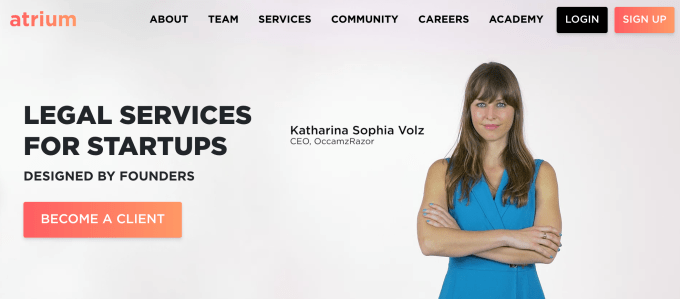
Justin Kan, formerly of Justin.TV and Twitch, announced a “tech-enabled law firm for startups.” called Atrium.
He said that through his experience co-founding and investing in startups, he had “become an involuntary power user of corporate legal services.” Estimating that there is a $158 billion market for outside spend on law firms, Kan believes that Atrium’s software will help turn legal documents into data. He says that his services are being used to save clients from hourly billing fees for contracts, M&A, blockchain and other paperwork. Atrium “makes legal services fast, transparent with upfront pricing.”
LUS Brands

LUS makes haircare products for curly hair.
After decades of media pressure for people to straighten their hair, the public is now embracing curly hair. But managing it can require tons of expensive products and time. LUS makes products for specific curliness levels for a range of ethnicities. It bootstrapped its way to $1 million in sales a year selling $17 products. Gross profit is 70 percent, and the company has $400K in the bank. Now it wants capital to scale up to dominate the $50 billion a year curly hair product market with a brand that stands for “Love Ur Self”.
Read more about LUS Brands on TechCrunch here.
ZBiotics
ZBiotics has made a genetically engineered drink that it says can prevent your hangovers.
The startup’s engineered probiotics break down acetaldehyde, one of the chief byproducts of alcohol metabolization that is thought to cause hangovers. Zbiotics says that when its product goes on sale at $5 per dose it will be the world’s first genetically engineered probiotic on the market.
Shogun
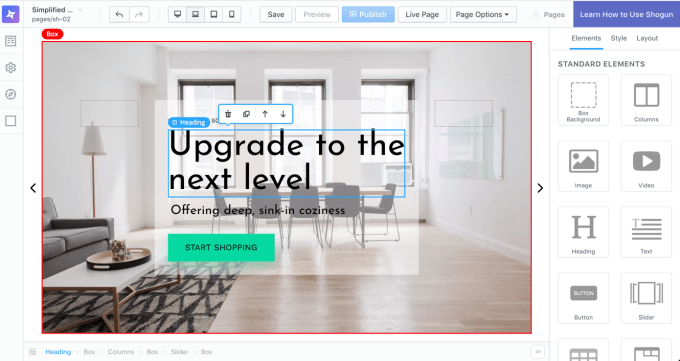
Shogun helps companies quickly set up storefronts.
Small businesses looking to get off the ground and get their products online might be paralyzed by the sheer volume of stuff that needs to get done before a click-to-buy button even appears. Shogun wants to create a simpler workflow for a page editor to set up an online store on platforms like Shopify. The service is specifically designed with nontechnical people in mind.
Read more about Shogun on TechCrunch here.
DearBrightly

DearBrightly offers personalized skincare prescriptions online.
Their primary product is a “retinoid”, which are used to help treat acne, psoriasis, and other inflammatory skin disorders. You send images of your skin to one of their partner dermatologists, you helps you establish a skin care regimen and get the necessary prescriptions.
Read more about DearBrightly on TechCrunch here.
Sketchbox

Sketchbox is photoshop for AR and VR.
They believe that someday there will be just as many AR/VR designers as there are web and graphic designers today. So far, they’ve worked with over 2000 designers and found that the “power users” are spending an average of 3.5 hours per week on the platform. Companies like Microsoft, Oculus and Eon Reality have tested out Sketchbox. It’s a $6 billion market opportunity, Sketchbox believes.
Read more about Sketchbox on TechCrunch here.
EnvKey
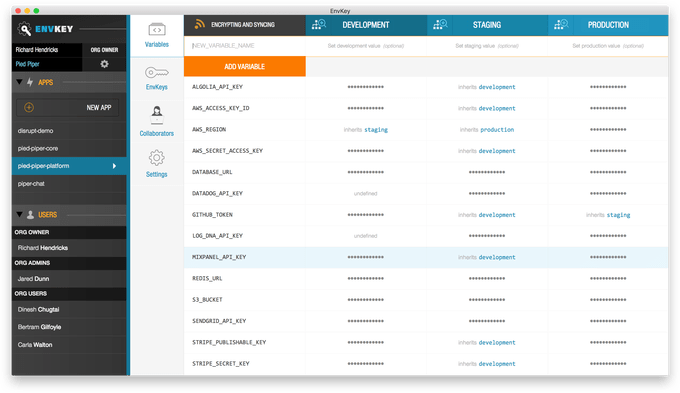
EnvKey wants to be the LastPass of API keys.
As companies get bigger and bigger, the complex network of tools and APIs they have to access might start to get out of hand really quickly. EnvKey is there to try to keep track of all those keys and secrets and make sure they get updated properly. EnvKey also has tools in place to make sure only the right people have access to them internally.
Read more about EnvKey on TechCrunch here.
Tradewind Bioscience

Tradewind Bioscience is working on drugs that block the spread of cancer.
Its two founders both independently identified a cancer protein that occurs during the metastasization of cancer and chose to team up to tackle the problem. They’re focusing first on ovarian cancer, though they say that their therapies will work with “most” cancers.
Read more about Tradewind Bioscience on TechCrunch here.
Arrow

Arrow wants to build Instagram for augmented reality.
Its app lets users attach text and emojis to real world objects and share videos of their AR creations. Its Autoemoji identifies common objects and facial expressions, and fills the screen with related emoji. The startup expects the number of modern AR-enabled phones to grow to 500 million in 2019, expanding its potential user base. Arrow’s public beta has seen 25K videos shared in 2 months. Building a new social content feed will be very difficult in the face of Instagram and Snapchat, but the autoemoji feature is innovative.
Wing It
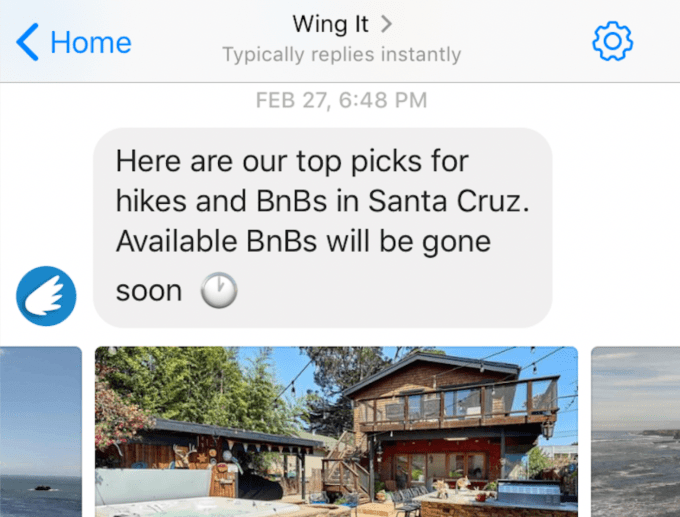
Wing It is a Facebook Messenger bot that tries to get you out of the house on a weekend trip.
It recommends AirBNBs, local hikes, and other activities based on your preferences — things like distance from home, cost per person, etc. They’re currently seeing 70% weekly engagement from their existing users.
Read more about WingIt on TechCrunch here.
Tipe

Tipe is a tool for developers that takes needless text out of their lives.
The startup makes it easier for developers to navigate code without have to constantly make content edits on the behalf of marketing, by enabling non-developers to make these changes quickly and easily.
Swayable

As our own Jon Shieber wrote here, “Swayable was founded by three former physicists to help craft political messages that actually inform and persuade rather than simply incite and propagandize.”
They aim to help political groups a/b test their messaging to determine what messaging works best, while only sharing information that is accurate. They currently have $100k in monthly books, with customers including the DNC, and the ACLU
Read more about Swayable on TechCrunch here.
Quantstamp

Quantstamp automatically checks smart contract security.
The new popularity of the blockchain has led to more enterprises using smart contracts. But manually checking their security is time consuming and expensive. Last year $300 million was compromised due to smart contract hacks. Quantstamp has developed an automated process that scans smart contracts for vulnerabilities.
It’s already earned $2.4 million in revenue doing six enterprise smart contract audits, and it has 50 customers in the pipeline who’ll pay $500K per audit. Quantstamp could take smart contracts mainstream by making enterprises confident they won’t get hijacked.
Glimpse K12

Glimpse is trying to cut ineffective spending at schools.
The company meshes education institutions’ accounting systems with student achievement data to help education institutions understand what they’re pumping money into and see where they’re getting the best return on investment when it comes to positive student outcomes. The team’s ultimate goal is to “fundamentally changing the way $800B is spend in education each year.”
ClearBrain

ClearBrain helps companies target ads at the users most likely to sign up for a subscription, buy a product, or cancel their account (for example).
It pulls data from the tools that businesses are already using (like Segment, Optimizely and Heap), then deploys artificial intelligence to analyze and group users based on how likely they are to perform a specific action. The ultimate goal, according to CEO Bilal Mahmood, is “to democratize AI for marketers.”
Read more about ClearBrain on TechCrunch here.
Players’ Lounge

Players’ Lounge is an online platform where gamers can compete for cash.
Players can deposit money into their account and then search for other players who are willing to throw down a few bucks over a game of FIFA or Fortnite. The startup’s rating system lets gamers know if they’re taking on someone with a similar skill set or are out of their league.The company takes 10 percent of wagers and says they are growing 25 percent week-over-week.
Memora Health
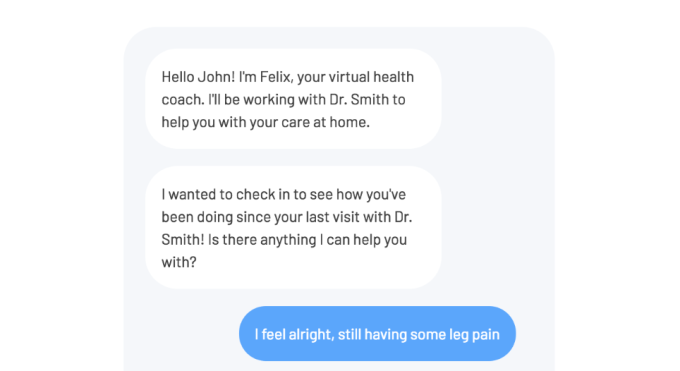
Memora Health is “building a virtual nurse for patient follow-up.”
It turns out that every time someone leaves a doctor’s office, nurses are getting paid to follow up with the patient about treatments. Memora aims to automate that interaction using artificial intelligence. So far they’ve achieved $70,000 in monthly recurring revenue and have $3.8 million secured in LOIs. They say they’ve “built the infrastructure to follow up with every single patient in the United States.”
Treasury Prime

Treasury Prime makes APIs for banks.
Most banks still run on old mainframe computers and manual changes, leading to delays for banking services. Treasury Prime says its can accelerate the process of opening a bank account from 3 days to 3 minutes. The startup is building APIs for checking balances and transaction history, sending and receiving money by ACH and wire, and more.
It now has a live integration with a bank that’s issuing real bank accounts with Treasury Prime’s API. With a team that built APIs for Silicon Valley Bank and Stripe, and who sold a previous company for $200 million, Treasury Prime wants to modernize banking.
Hunter2
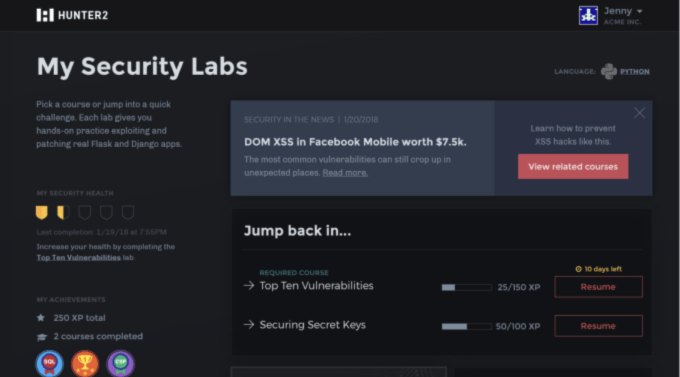
The moment a massive breach happens, Hunter2 hopes to already have a lab demo online for engineers to practice on.
Hunter2 serves as a tool to train engineers to better handle web app security through a soft-touch approach, giving employees semi-regular reminders of what skills the need and then having exercises build around real-world experience like the Equifax hack.
Read more about Hunter2 on TechCrunch here.
Slite
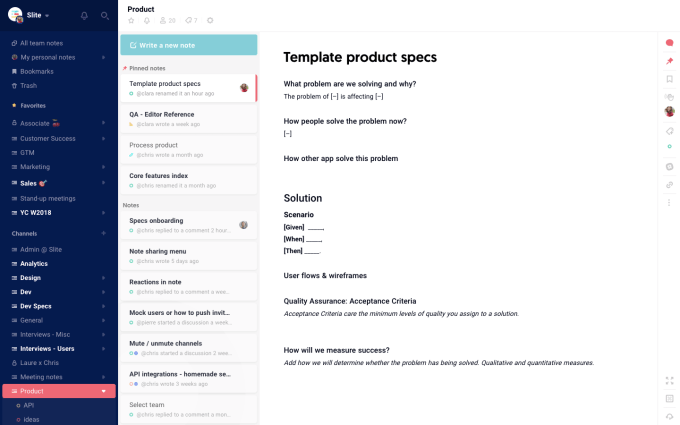
Slite is trying to reimagine collaborative tools for teams.
Imagine if Google Docs were developed by someone at Slack. Google Docs is already a pretty simplistic experience, but Slite aims to create a set of collaboration tools around a traditional notes application. The goal is to create a kind of hub where teams can come in and drop notes, ending up with something similar to an internal wiki.
Read more about Slite on TechCrunch here.
The Podcast App
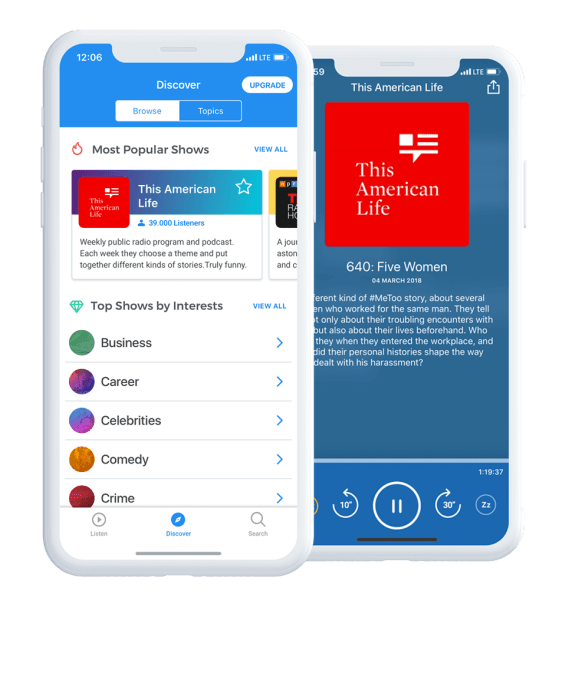
The Podcast App wants to be the Netflix for…podcasts.
With 500,000 shows and 30 million episodes out there, The Podcast App helps people listen to spoken audio content, but eventually wants to move into discover and exclusive content subscriptions. The company expects there to be 500 million monthly podcasts listeners in five years, and wants to get 10 percent of them to pay $10 per month for exclusive access to top creators. The Podcast App has grown 50 percent month over month for a year, and now has 40,000 daily active users. But it will have to rise above a legion of other podcast apps, including previous YC startup Breaker which has the same strategy.
Read TechCrunch’s full coverage for more on The Podcast App
Groww

Groww wants to be the Robinhood for India.
The company says that while there are 250 million people in the middle class in India, only about 10 million of them are investing online. The startup is beginning its efforts with mutual funds, earning a 1 percent commision on transactions. Next the company is looking to take on stocks, bonds and cryptocurrencies.
Persephone Biome

Persephone Biome is trying to retune the gut microbiome to help cancer drugs work. They’re making a pill that contains gut bacteria.
They expect to go into clinical trials in 2019.
Biobot Analytics
Biobot Analytics analyzes city sewage “to estimate opioid consumption.”
Currently, “the best data is counting people who die,” which isn’t enough to help cities make predictions. The MIT-experienced founders said they are “passionate about using our skills to tackle the biggest drug crisis in American history.” So far they’ve received 17 letters of interest and believe this is a $1.5 billion per year market opportunity in the U.S. and Canada alone. In addition to drug use, they hope to also measure pharmaceuticals, infections disease and food consumption. This is “data that companies would pay billions for.”
Nectome
Nectome aims to preserve people’s brains, for when and if scientists ever develop a method to upload your memories to a computer.
The catch (as explained by co-founder Robert McIntyre) is that the method is “100 percent fatal” — the company’s plans involve terminally ill patients, under anesthesia, to a heart lung machine that will pump embalming chemicals into their arteries.
Read more about Nectome on TechCrunch here.
Promise
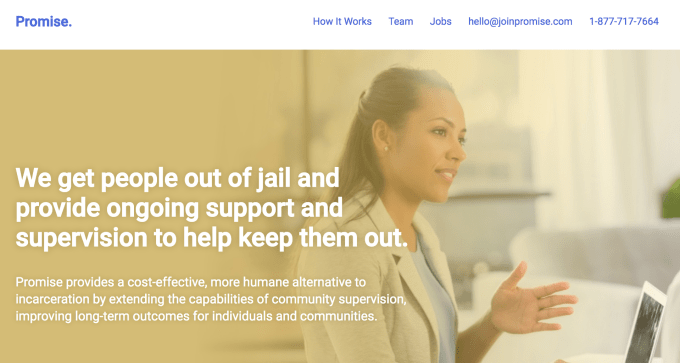
Promise is a bail reform startup, offering counties and local governments an alternative to holding low-risk people behind bars simply because they can’t afford bail.
For each participant, Promise provides counties with a comprehensive intake procedure and then sets up each participant with a care plan specific to them. Promise will then monitor and support participants by helping them ensure they know when they’re supposed to appear in court, and remind them of obligations like drug testing or substance abuse treatment needed. The app also provides participants with job training, housing, counseling and referrals.
Read more about Promise on TechCrunch here.
Beanstalk
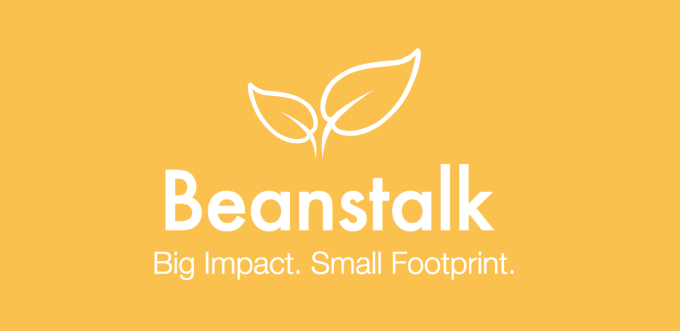
Beanstalk is an indoor farming startup that can grows produce at the cost of outdoor farming.
The company simplifies operations while reducing cost with its own custom machinery that takes on some of the high-cost areas for outdoor farming. Beanstalk holds some advantages, namely they don’t have to worry about weather and don’t need pesticides. They’re focusing on heirloom greens like spinach to grow to start and are focused on customers within 100 miles of where they’re growing.
Nutrigene

Nutrigene makes personalized supplements based on your own health data.
Users upload their 23andme (or similar) data, and they try to create tailored supplements accordingly. Eventually, they intend to move into personalized medicine. They’ve say they’ve made $17,328 in revenue since launching 2.5 months ago, with a margin of 50% per order.
Read more about Nutrigene on TechCrunch here.
Precious

Precious is an iPhone app that uses AI to curate your baby photos.
It “scans that mess and finds the meaningful moments,” they said on stage. So far they’ve gotten 54,000 paying monthly subscribers and “create and update the perfect album for every child as they grow.” Using specialized AI, it determines what it thinks are the best photos and sends them to customers regularly. So far they say they have $180,000 in monthly recurring revenue and are profitable. They believe this is a $20 billion market opportunity.
Zyper

Zyper wants to “re-create social networks for brands”.
It identifies a brand’s most engaging users, and offers them rewards relevant to the brand’s products (not money) in exchange for posting content about that brand. The company says they’ve made $1m in revenue since launching 9 months ago.
Cognition IP

Cognition IP is a tech-enabled patent law firm focused on getting the job done quicker and cheaper.
The startup claims they charge half the price of traditional law firms and that they file patents in 14 days while larger firms spend as much as 30 days getting patents filed. The company did this by building automation tools, like a smart search engine that takes a patent application and finds similar ones. They’ve also automated formatting, and built software that fills out forms for users. The company launched three months ago and is profitable with $200k in revenue.
Mirror AI

Mirror AI takes a photo and creates “thousands” of emoji that look like you. A few weeks after launching, they’ve got 300,000 installs.
Tarjimly

Tarjimly connects refugees and immigrants with native speakers of their language for help navigating difficult situations, from paperwork to disaster response.
It’s anonymous, free, and works entirely within Facebook Messenger, with more platforms on the way.
Read more about Tarjimly on TechCrunch here.
OurMenu

OurMenu replaces ordering from a waiter with ordering from a website.
Labor costs are huge for restaurants. OurMenu wants to let you order from your phone at your table instead of talking to a waiter, and without downloading an app. You scan a QR code on the table, choose your food, order and pay, and then the food is brought to you. OurMenu plans to charge restaurants $300 per month for the tech, and will aggregate the menu choice data to sell back to them.
Archform

Archform is teeth aligner software startup that lets orthodontists create, design and 3D print aligners within their own offices.
The idea is to provide orthodontists with a way to better compete against some direct-to-consumer teeth aligner startups and cut down on the cost of Invisalign.
Read more about ArchForm on TechCrunch here.
Ropeo

Ropeo wants to be the Stitch Fix of Latin America.
The company offers a monthly clothing subscription service with some features optimized for its particular market. The company allows users to try before they buy and takes cash on pickup because credit card use is so low in LatAm. The company believes that they’ll be able to negotiate better deals with partners as they scale and that after clothing, they’ll be able to grow to sourcing different types of apparel.
Pulse
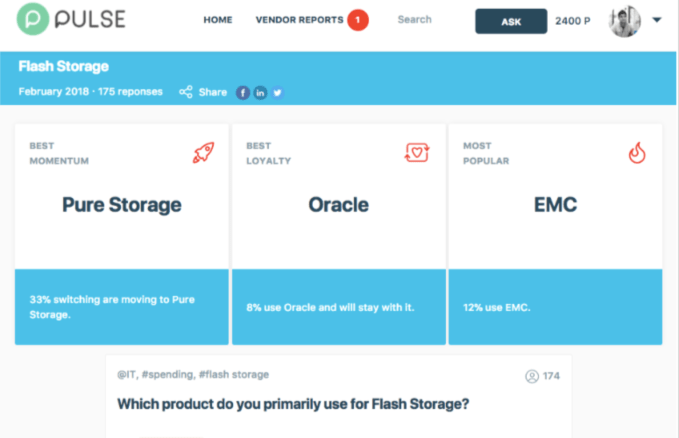
Pulse is trying to crowdsource research and advisory reports by tapping a community of IT execs.
They currently have 3,000+ IT executives on the platform, and say they’re growing by over 100 companies per week. Its reports are free, instead aiming to make money buy connecting IT buyers and vendors.
Read more about Pulse on TechCrunch here.
Playbook

Playbook is for college students who want to hang out.
It’s an app with 240 beta users at Harvard, 30% of whom use it daily. In March, they organized 101 get togethers and “most the people that hung out and had a great time didn’t know each other beforehand.” It’s available on both iOS and Android.
Read more about Playbook on TechCrunch here.
Delphia

Delphia works with publishers to create applications that help their readers make decisions — think of them as BuzzFeed quizzes, but for complex decisions, and with real data science on the backend. The company’s first application was called Vote Compass, which told users how their political views line up with election candidates. Now it’s expanding beyond politics.
Read more about Delphia on TechCrunch here.
Dana Cita

Dana Cita offers student loans in Indonesia.
Previously, there were no loans in the 260 million-person country where 76 percent of people are unbanked. Dana Cita believes student loans can be the start of an adult’s financial life, and a way to recruit long-time customers for other financial services. It’s originated $100K in loans to 52 borrowers so far. The question is whether after seeing the student loan debt crisis in America, Indonesians will want to take money from a startup.
Tributi

Tributi wants to build a TurboTax for Latin America.
The startup says that the vast majority of people in Latin America have their taxes prepped by individual accountants rather than using software products. The company says upcoming tax reform across the continent will drive even more traffic to solutions like theirs. The startup says it is growing 25 percent week over week since launch.
EasyEmail
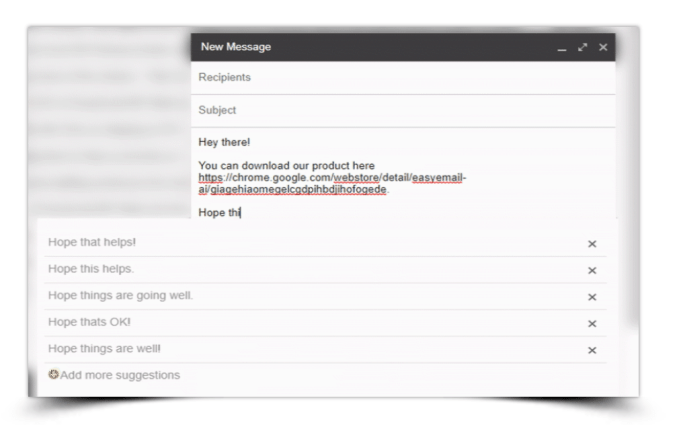
EasyEmail is a Chrome plugin that analyzes your emails finds your most common phrases and autocompletes sentences for you.
So much of the emails that we send feel like they’re being written on autopilot. Wouldn’t it be great if they actually were? For users sending a lot of repetitive sales or PR emails, the service offers a system that will keep you from copy-pasting up a storm and let you intelligently blaze through your emails.
Read more about EasyEmail on TechCrunch Here.
Ben

Ben aims to be a unified platform for learning about, buying, selling, and storing cryptocurrency.
With the hundreds of wallets and exchanges floating around in the blockchain ether, it’s easy for novices to get lost in the fray. Ben’s mobile app distinguishes itself from other wallet exchanges by integrating crypto education, using the platform to also deliver news about currencies and offer Q&As related to crypto investing.
Medumo
Medumo aims to reduce day-of medical procedure cancellations.
Last minute schedule changes can be costly for both the patients and the medical facilities.
But a lot of these cancellations aren’t by choice, but rather because patients forgot to fast or avoid certain foods before a procedure. Medumo offers support over text and email, providing instructions so that the patient is ready when they need to be. For its customers, they say it’s resulted in a 30% reduction in no shows.
from Startups – TechCrunch http://ift.tt/2pxvQbd
